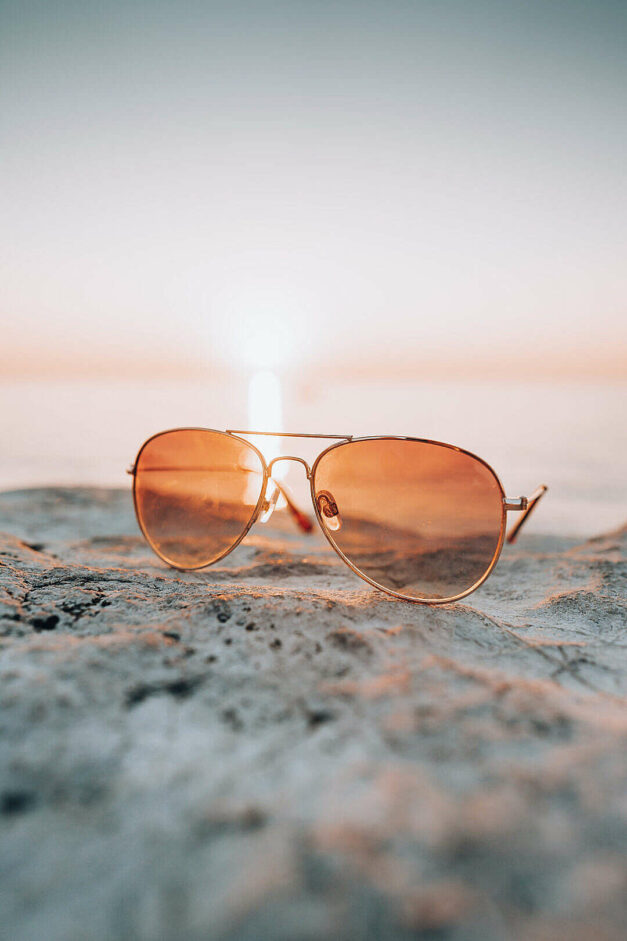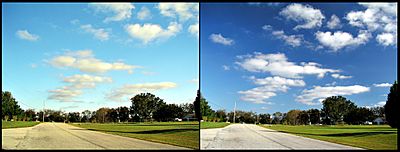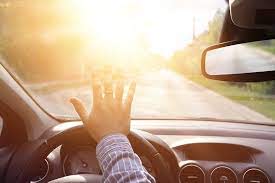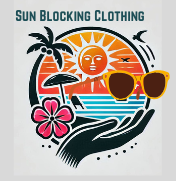Do I continue to wear sunglasses in the fall and winter? Are they as important in cooler seasons as in summer? As we come to grips with protecting our skin from the sun and the damage caused by too much sun, has the message gotten to you? Sunglasses are where you should start your sun blocking clothing wardrobe.

Yes is the answer to the question, “Do I continue to wear sunglasses in the fall and winter? Your sunglasses are the starting place for your sunblocking wardrobe. They are not accessories. They are the main feature of your protection against the sun
Unfortunately, I was slow to figure this out. I still think of them as accessories if I am not careful. It is hard to change our approach to taking better care of ourselves.
So going forward, I am challenging myself to get this part of my protection from the sun right. Where are you with your thinking about a sun-blocking wardrobe? Have you made the thinking shift about sunglasses?
I just read an article by a person who claims to be a De-Cluttering Expert. She said that the problem with decluttering is that there is no finish line. It is a lifetime journey. I fear she is right and I will never get done with my own decluttering.
It is the same with learning to protect my skin with clothing. Thinking of sunglasses as clothing just doesn’t ring true for me, so in my on defense, I have reached out to use the words “tools” to protect my skin from the sun. Do you consider sun hat clothing? Or could it be a tool?
I think learning to stay safe in the sun is a process with no finish line to cross and be done.
Why Do We Need Our Sunglasses During The Fall And Winter?
Did you stop and ask yourself what you needed your sunglasses to do for you during the fall and winter? I hate to admit that I did a bit of a backstep, with no automatic answer popping into my mind immediately!
Of course, I want my sunglasses to protect my eyes from the sun, yes in the winter too. A lifetime of living in bright sunny climates, I don’t even think about it. But when thinking about trying to share the reason we needed sunglasses sometimes besides summertime, I was a bit stumped.
Not everyone is fortunate to live in our sunny part of the world, and it may seem a bit over much to say you need them every day. But, we do indeed need to protect our eyes.
Protecting your eyes is similar to protecting your skin. You cover them both. Keeping the sun off of and out of your eyes protects your vision. Besides sunburn protection for your eyes, you need to protect the skin around them as well to be able to keep skin cancer away.
So remembering to wear your sunglasses is a good way to ensure better vision. Wear them in summer, spring, fall, and winter.
As we are thinking about the transitions of the seasons and how to easily roll the better skin-protecting habits we have started into the fall and winter, our sunglasses are important.
As time passes, ultraviolet ray exposure can cause vision problems just like sun exposure to your skin can cause problems. When you wear your sunglasses throughout the day, you keep your eyes from drying out so badly, as well you also keep them healthier because of the protection from the sun.
Making sure to wear your sunglasses while outside can slow down the development of cataracts and macular degeneration. In some regions of the world, good sunglass-wearing habits will eliminate cataracts and macular degeneration.
Be Proactive, Not Reactive When Protecting Your Eyes
We know that UV rays can cause severe eye damage, however as many of these effects will not be visible until you get older, we tend to ignore prevention.
Speak with your eye doctor about simple habits you can build to protect your eyes. Habits that will reduce your eyes’ exposure to UV light.
Wear your sunglasses if you are outside for a good part of your day. Wearing sunglasses is the one thing you can do when you spend a lot of time in the sun. This will not only protect your eyes but also helps you maintain healthy vision.
Being out in the sun for large portions of any day can accumulate eye and skin damage. So the number one reason for sunglasses is protection from the sun.

What Kind Of Sunglasses Are Best
You should have some idea by now of your personal preference for sunglasses.
The darkness of the lenses in your sunglasses is more of a personal preference. You can block 100% of the ultraviolet rays with lightly tinted lenses, or dark or somewhere in the middle. Consult the label on the sunglasses for the percentage of UV blocking ability.
The darkness of your lenses should be determined by how sensitive your eyes are to the sun. I prefer a darker lens now, as I have already had to have cataract eye surgery. Before surgery, I liked a medium dark color.
Remember, you should always remove your sunglasses when you are inside. (unless you have a medical reason your eye doctor says otherwise) I am referring to the safety factor. Often indoors your vision is limited enough that it is a safety risk to walk about with your sunglasses on.
If your vision is weak and you can’t see very well, you will probably be less sensitive to the sun and should consider a lighter ting on the sunglasses.
The season is changing, and the angle of the sun in the sky has the potential to damage the eye in ways the summer sun can’t.
Because of the lower angle, we are exposed to these more slanted sun rays. Yes, they are ultraviolet rays, regardless of the angle. In my part of the world, we drive a lot and are vernable when driving to these rays reflecting off the roadways. As there is a handicap with the glare, use caution for late evening and nighttime driving.
If you are farther north than central Texas, you have more occasion to deal with snowpack on the roads while driving, as well as in your outdoor sports.
A Bit Of History
I had a pair of sunglasses 20 or so years ago that was ordered from some ad on TV or a magazine, I have forgotten which. They were great for reducing glare at night. That was an advertised feature, that they were for night vision.
While I could see better, I thought, I soon forgot about them and decided to wear “night driving glasses” was more a catchphrase to sell glasses as for as I was concerned. An eye exam was what I was needing!
I was beginning to have issues with glare because of the film that too much sun was causing to form on my eyes. Here is a list I borrowed from Mayo Clinic’s pamphlet about the symptoms of cataracts:
- Blurred or clouded, vision.
- Experiencing increasing difficulty with vision at night.
- A noticeable sensitivity to bright light and glare.
- Requiring a brighter light for reading and other activities.
- Seeing “halos” around lights.
- Frequent changes in eyeglasses or contact lens prescription.
- Colors are no longer sharp and bright.
- Double vision in a single eye.
Think about this list and see if any of these symptoms have quietly entered your world.
If you wear darker-colored lenses in your sunglasses, they need to be removed as it gets near dusk. Safety is important, and anytime you are limiting the light, as when wearing your sunglasses, wear them in full sunlight, not twilight.
So, we know that we should wear sunglasses to protect our eyes from the sun, and to keep the skin around our eyes safe from the sun. Searching for the label that states 100% UV blocking.
Color of lens and style are personal choices.

Will Polarised Sunglasses Help My Vision?
Glare can be dangerous while you are driving. As I have mentioned in other posts, driving is a part of life here in my part of Central Texas. We deal with glare all year long. Maybe not as bad as your guys who live near the water, or where there is a good snow pace. But the neverending sun assures there is glare.
The treatment on your sunglasses lens that helps with this glare is what we know as “polarize.” Most people in my part of the world want this extra coating on our sunglasses. So when I am looking for new sunglasses, I look for 100% UV block and polarized protection of the labels.
By doing away with the glare reflections you can see the true colors, and see more clearly. Glare from the sun has been linked to traffic accidents including pedestrian death.
Here are some of the results you should expect when wearing polarized sunglasses helping your eyes with safer sun exposure:
- When You are driving: Statics tell us that more motor vehicle accidents happen when there is glare. Glare can make it more difficult to recognize hazards and react safely to them. Polarized sunglasses block glare and make it easier to avoid dangerous situations when driving.
- If you play outdoor sports: Just as with driving, polarized sunglasses help athletes see with greater clarity so they can safely move as needed while competing or practicing their outdoor sports skills.
- All-day activities outdoors: If you will be spending a lot of time outdoors, wear polarized sunglasses. Reducing the need to deal with glare can make your eyes less tired, as well as keep you safer.
Will Polarized Lens Protect Better Than Just 100% UV Blocking Lens?
Polarization is a process in addition to UV Blocking protection. Polarization does not protect your eyes from the sun. It helps most of us see better.
This explanation cleared some questions for me, maybe it will for you too:
Light travels in waves, so it vibrates.
Light normally vibrates in many directions.
When light reflects off a flat surface like snow, water, or the roadway ahead of you, it no longer bounces all over. The reflection moves in only one direction. That direction is horizontal.
Because the light is only vibrating in one direction, it becomes concentrated, hitting the eye directly. We call this concentrated light, “glare.”
So having a lens that controls this glare is beneficial, at least for me.
The difference between polarized and non-polarized lenses is how they handle glare.

What Are Non-Polarized Lenses
With non-polarized sunglasses, the lenses are designed to reduce the intensity of any light.
If your lenses offer ultraviolet or UV protection, they most likely contain special dyes and pigments that absorb ultraviolet rays. This will prevent the UV rays from reaching your eyes.
This special coating is applied on the lens or it can be mixed into the actual product forming the lens.
This technology works the same way for all types of sunlight, no matter which direction the light vibrates. So, you can have UV protection with no polarization. The choice is yours, and what works best for you
So with no polarization, glare will still reach your eyes with more strength than other light. This strength in the glare can have an impact on your vision.
Now, let’s consider the difference between polarized lenses in your sunglasses.
What Are Polarized Lenses
Polarized lenses are treated with a chemical to filter out light.
Because the filter is applied vertically, vertical light rays can pass through. This method of vertical application stops horizontal light rays from coming through.

Think about a picket fence with an inch between each slat.
A popsicle stick would fit between the slats if you hold it vertically. However, if you turn that same popsicle stick sideways, so it’s horizontal. It no longer will fit between the slats of the fence.
So this is the general idea behind polarized lenses. Some vertical light can pass through the filter, but horizontal light, or glare, is unable to get through.
Most people who are active in sports outside prefer polarized lenses to take care of part of the sun’s glare. They can make decisions based on a clearer and sharper image of the terrain around them.
Ok, so getting the glare out of our vision is a good thing for most wearers. But if you have reservations, or just can’t wear sunglasses with polarized protection, are there other ways of getting rid of glare?
What Are There Alternatives To Polarised Lenses?
Are you one of those people who find polarized glasses uncomfortable or may not be able to wear them due to their work? When you can’t wear polarized lenses for whatever reason, here are a few suggestions for alternatives.
Just look for an anti-reflective coating. This kind of coating is available for both sunglasses and reading glasses.
You could choose mirrored sunglasses. The mirrored finish on the less decreases how much light enters your eyes.
There is also a coating called photochromic for lenses that automatically darken when exposed to a certain amount of light. Usually reserved for those with visual issues. However, this photochromic finish is an excellent answer to the problem of glare and too much light for some individuals.
Are Polarized Sunglasses Better?
With all this fuss about polarized sunglasses, they are not any better at protecting your eyes from UV light than regular UV lenses, but they can make it easier for you to see.
Because they can block horizontal light waves, the type that most surfaces reflect when causing a glare. Only vertical waves make it through the filter in these lenses.
Polarized lenses help your vision because they:
Reduce the glare and increase your visual comfort. Your eyes are not straining to see. This helps prevent eye strain and fatigue.
Polarized lenses sharpen the contrast between light and dark.
Also, polarized lenses allow you to see the true colors.
Polarized lenses are available in a variety of colors. with the most common colors, gray and brown. Green and yellow are also popular.
What If I Can’t Wear Polarized Sunglasses?
While most of us can wear polarized sunglasses some can’t.
If the polarizing treatment makes you feel dizzy and disoriented, it would be dangerous for you to wear them. One of the alternatives might be better for you.
Some who have tried to wear sunglasses with the polarized treatment say that the lenses make everything looks 3-D. This would make UV-treated lenses a better choice.
Do you need to read digital numbers on a liquid crystal display (LCD)? Pilots are a great example.
Polarized lenses tend to make information on an LCD hard to read. This makes polarized lenses not the best option for people in those situations.
Polarized Or UV Blocking Or Both?
Polarized sunglasses are sealed with a finish with filters to tone down glare. This finish works by blocking the light waves bouncing off horizontal or flat surfaces. You should not try to stare at the sun just because you think it is safe. There are often ways glare can get to your eyes and do damage.
The addition of a polarized treatment to lenses is helpful when you’re driving or participating in sports.
This does not make polarized sunglasses right for every situation.
If you’re:
Driving at night, the polarized lens may not be the best for you.
Wearing polarized sunglasses, even in the daytime while navigating icy patches, while driving or while walking or skiing can be dangerous if you are not extremely careful.
When using LCD readout devices, polarized lenses may make it harder to see the digits.
Often Asked Questions
#1 Are Polarized sunglasses good for active sports?
Yes, they can be. Especially on sunny days. They can be helpful for activities that are near or on the water. Boating and fishing are great examples of polarized sunglasses being the tool of choice for better visual skills. Of course, there is the help polarized lens gives when there is glare from the snow, making winter sports safer and more fun.
#2 Is Driving Safer with Polarized sunglasses?
Yes for seeing the road, and obstacles in the way. If the dials on the dashboard are LCD, they may be harder to read. They are not as good for night driving because they may limit visibility.

Sami’s Take On Do I Continue To Wear Sunglasses In The Fall And Winter?
Sunglasses are considered sun blocking clothing. Sunglasses are considered sun blocking clothing- I am not sure filling the page with repeated information is the way to get this through my head. As I learn more about how we can safely dress for being out in the sun, I know the statement is true.
However, a life time of careless habits makes me no longer able to disregard or forget these statements. I was in the doctor’s office going through the pre-op routine for cornea surgery.
The lady sitting waiting with me asked why I was there. You know, the usually waiting room questions. She shared that she lost her eyesight due to excess sun exposure. She had ignored the sunglass protection that had come her way and continued to drive and work in her garden until she started having vision problems.
Then it was too late. She said that she should have been the posterboard lady for foolishly ignoring the many ways she could have protected her eyes while out in the sun. She thought she was being tough, and independent.
Now she said that it was stubborn, stupid and so needless. She would be unable to tell night and day within a year, her Doctor told her.
Will this be your story? Are you ignoring the safety information for covering your eyes, and your skin? Will you be blind and have skin cancer as well? I don’t remember seeing obvious skin cancers, it was wintertime and of course, we were in long sleeves and long pants.
As I was just learning about skin cancer I didn’t think about asking her this question. However, the fear of being blind was frightening for me.
I already had a hole in one of my corneas at that time, that was scary enough. Adding a lifetime of sun carelessness was a bit much.
